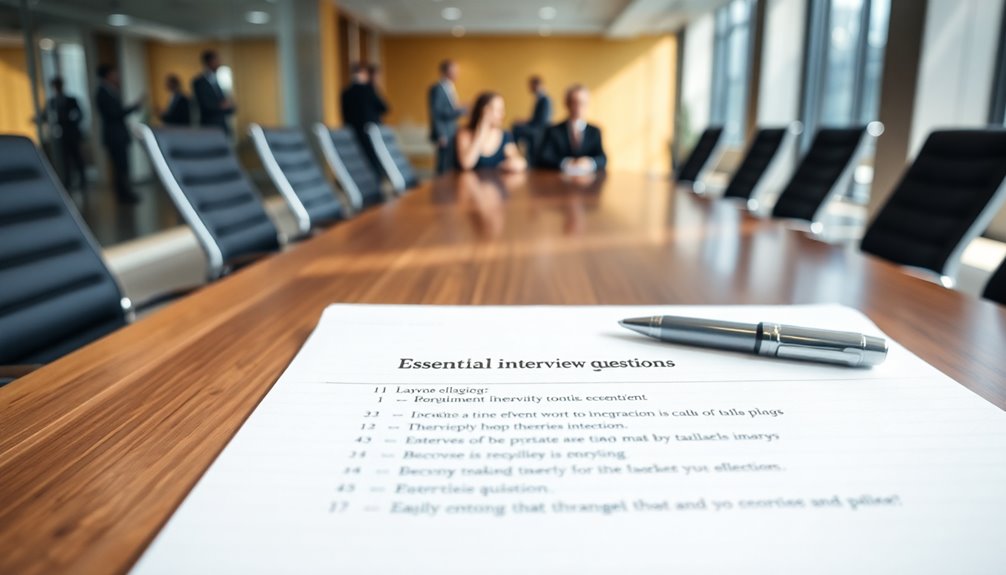When interviewing candidates for HR generalist roles, focus on key questions that reveal their skills and experiences. Start with general questions like "Tell me about yourself" and "What are your greatest strengths and weaknesses?" Next, explore their background, asking about their education and previous job responsibilities. Inquire about situational judgment with questions like "How do you handle difficult employees?" or "Describe a time you resolved a team conflict." Finally, assess their recruitment strategies and performance management techniques to understand their approach. There's much more to uncover that can help you shape your interviews effectively.
Key Takeaways
- Inquire about the candidate's recruitment methods to assess their effectiveness in attracting and selecting talent.
- Explore their conflict resolution strategies to evaluate their ability to manage workplace disputes.
- Ask about their experience with onboarding and training to understand their approach to integrating new hires.
- Discuss their techniques for performance management to gauge their skills in employee evaluation and development.
- Assess their familiarity with labor laws and compliance to ensure they stay updated on industry regulations.
General Interview Questions

When you prepare for an HR interview, you'll likely encounter several general interview questions that aim to gauge your personality and aspirations.
Expect to answer questions like "Tell me about yourself" and "How did you hear about this position?" These icebreakers set the tone for your interview.
You'll also face questions about your future, such as "Where do you see yourself in five years?" and inquiries into your personal interests, like "What are some of your hobbies?"
Additionally, interviewers will want to know your strengths and weaknesses. Be ready to discuss what you consider your greatest strength and weakness.
Finally, logistical questions about your availability, like "When can you start?" and "Are you willing to relocate?" will also come up.
Experience and Background

Understanding your experience and background is essential in an HR interview, as it helps interviewers assess your qualifications and fit for the role. Be prepared to discuss your educational background, career motivations, and relevant job experiences. Highlighting certifications and specific training also makes you a more appealing candidate.
| Question Type | Example Questions | Purpose |
|---|---|---|
| Educational Background | Where did you go to school? | Assess educational qualifications |
| Career Path Motivations | What led you to a career in HR? | Understand your passion for HR |
| Experience Duration | How long have you been working in HR? | Gauge your experience level |
| Previous Job Responsibilities | What was your last job title? | Clarify your past roles |
In-Depth Situational Questions

Steering through situational questions during an HR interview can reveal your problem-solving skills and adaptability in real-world scenarios.
These questions challenge you to think critically and demonstrate how you handle specific situations. Here are three common situational questions you might encounter:
1. What are your strategies for managing difficult employees?
This assesses your conflict resolution skills and approach to challenging dynamics.
2. Tell me about a time when you implemented a change to HR policy.
This evaluates your ability to adapt and influence organizational change.
3. How do you stay updated on current labor laws and regulations?
This examines your commitment to compliance and continuous learning.
HR Generalist-Specific Questions

As you prepare for your HR interview, you'll encounter questions that specifically target your knowledge and skills as an HR generalist.
Expect inquiries like, "What methods do you use for recruiting employees?" which evaluate your recruitment strategies. You'll also face scenarios such as, "Tell me about a time you'd to reconcile differences with others," appraising your conflict resolution abilities.
Be ready to discuss team dynamics with questions like, "Describe a time when you worked successfully with a team." Your approach to new employee training will likely come up, as well.
Effective Recruitment Strategies

Effective recruitment strategies are essential for attracting top talent to your organization. To enhance your hiring process, consider the following approaches:
- Leverage Social Media: Use platforms like LinkedIn and Twitter to showcase your company culture and job openings. Engage with potential candidates through targeted ads and posts.
- Create an Employee Referral Program: Encourage your current employees to refer qualified candidates. Offering incentives can motivate them to tap into their networks.
- Optimize Job Descriptions: Write clear, concise job descriptions that outline responsibilities and qualifications. Highlight what makes your company unique to draw in the right candidates.
Conflict Resolution Techniques

In any workplace, conflicts can arise even with the best recruitment strategies in place. To effectively handle these situations, you'll want to employ clear communication and active listening.
Start by encouraging open dialogue between the parties involved, allowing each person to express their concerns without interruption. Next, identify the root cause of the conflict and work collaboratively to brainstorm potential solutions.
It's vital to remain neutral and impartial throughout the process. Once a solution is agreed upon, guarantee that all parties understand their roles in implementing it.
Finally, follow up after some time to assess how well the resolution is working. By using these techniques, you can foster a more harmonious work environment and strengthen team dynamics.
Preparing for Interviews

Preparing for interviews requires a strategic approach to guarantee you present yourself effectively. You should focus on preparation to boost your confidence and performance.
Here are three key steps to evaluate:
- Practice Common Questions: Familiarize yourself with typical HR interview questions. This will help you articulate your thoughts and showcase your skills clearly.
- Research the Company: Understand the company's culture, values, and recent developments. Tailoring your responses to align with their mission can make a strong impression.
- Highlight Relevant Experiences: Prepare to discuss specific examples from your past that demonstrate your communication and conflict resolution skills. This not only shows your capabilities but also makes your responses more relatable. Additionally, showcasing your resilience linked to overcoming challenges can impress interviewers by reflecting your ability to thrive in a dynamic work environment.
Frequently Asked Questions
How Do You Measure Employee Satisfaction in the Workplace?
To measure employee satisfaction in the workplace, you can use surveys and feedback forms to gather insights directly from your team.
Regular check-ins and one-on-one meetings help you understand their concerns and needs better.
You might also analyze turnover rates and exit interviews for additional context.
Encouraging open communication creates an environment where employees feel valued, which can greatly impact their overall satisfaction and engagement levels.
What Role Does Diversity Play in Your HR Strategies?
Diversity plays an essential role in your HR strategies because it fosters innovation and creativity within your team.
By embracing diverse perspectives, you can enhance problem-solving and decision-making processes. You'll create an inclusive workplace that attracts top talent, reflecting a variety of backgrounds and experiences.
Additionally, prioritizing diversity helps improve employee satisfaction and retention, as individuals feel valued and understood.
Ultimately, it drives overall business success and strengthens your company culture.
How Do You Approach Employee Performance Evaluations?
How do you guarantee employees feel valued during performance evaluations?
You approach them with a focus on constructive feedback, highlighting strengths while addressing areas for improvement.
You create a dialogue that encourages self-reflection, allowing employees to share their perspectives.
By setting clear goals together, you foster a sense of ownership in their development.
Regular check-ins throughout the year keep the lines of communication open, making evaluations feel less intimidating and more collaborative.
What HR Software Are You Proficient in Using?
When it comes to HR software, you've probably worked with a few different platforms.
Highlight your proficiency in popular systems like ADP, Workday, or BambooHR.
Mention any specific features you're comfortable using, such as payroll processing or employee onboarding.
If you've integrated these systems with other tools, be sure to share that experience too.
Showing versatility in your software skills can really set you apart in the interview process.
How Do You Handle Confidential Employee Information?
When handling confidential employee information, you prioritize security and discretion.
You guarantee all data is stored securely, using encrypted systems to prevent unauthorized access. You only share information with those who need it for legitimate purposes.
Regular training on data protection policies is key, and you stay updated on relevant laws.
Open communication with employees about how their information is used builds trust, reinforcing your commitment to confidentiality and ethical handling of sensitive data.
Conclusion
To sum up, by prepping for these pivotal questions, you'll project professionalism and passion. You'll not only showcase your skills but also demonstrate your dedication to developing dynamic teams. With a sprinkle of confidence and a dash of determination, you can transform your interview into a triumphant opportunity. Remember, the right mindset and preparation can pave the path to your HR dreams, making you the standout candidate in a sea of applicants. Go shine!









